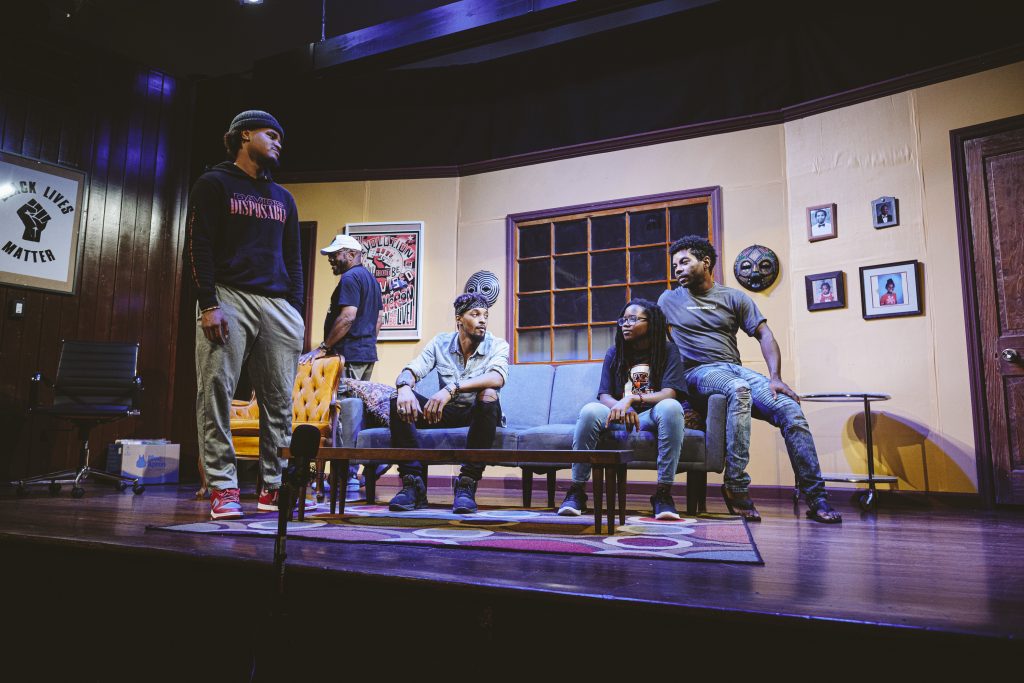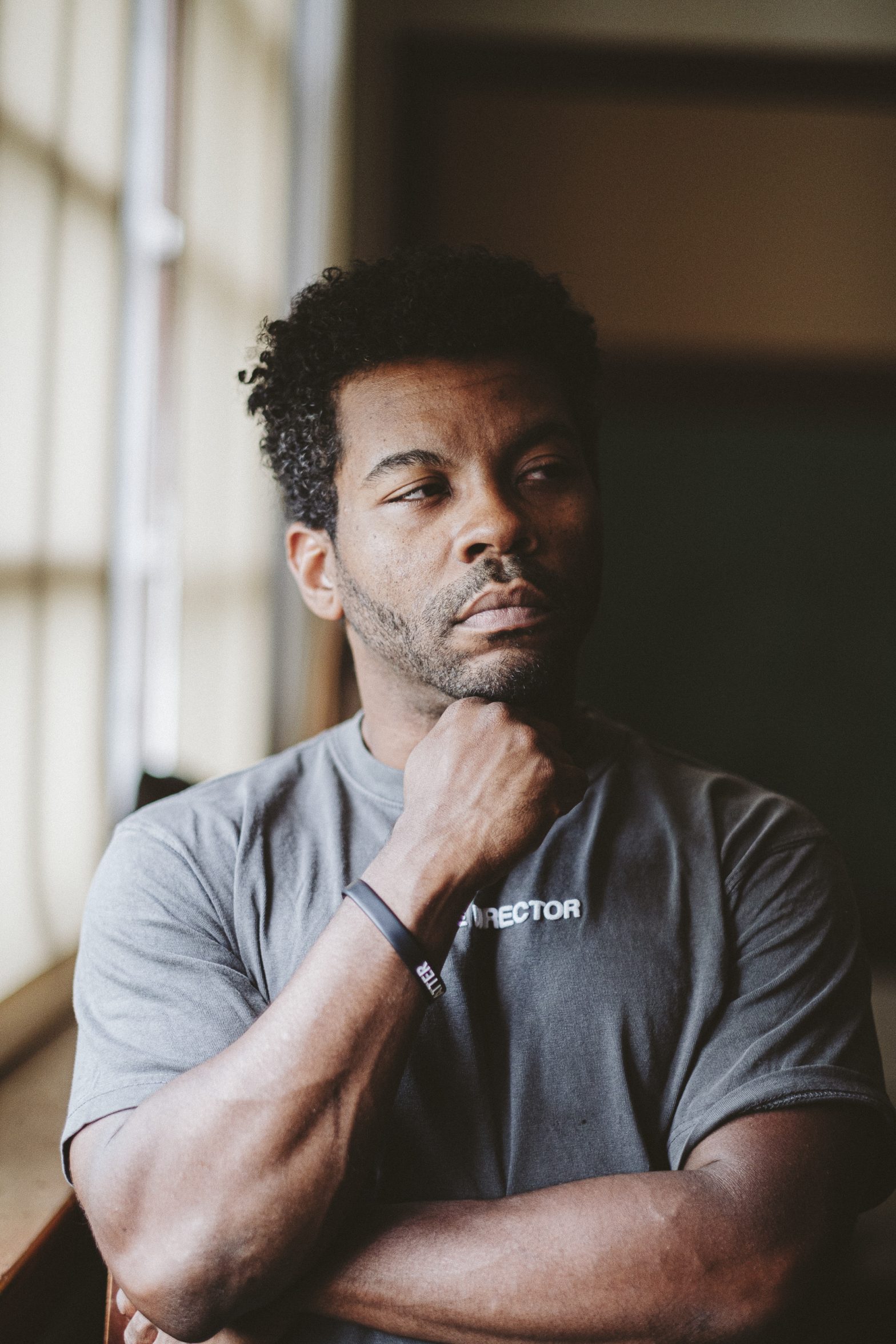By Julia Stumbaugh
On August 23, 2020 a Kenosha, Wisconsin, police officer shot a 29-year-old Black man named Jacob Blake in the back. In the days that followed, Charlottesville actor and director David Vaughn Straughn sat down to write a play.
“I felt this anger and intolerance and frustration,” says Straughn. “I knew that was inside of me, and I wanted to find a healthy and constructive outlet to get all of that out.”
The shooting came to the attention of Straughn—and the entire nation—because one of Blake’s neighbors filmed the incident on her phone. Earlier that summer, 17-year-old Darnella Frazier captured the world’s attention when she filmed the murder of George Floyd in Minneapolis. Straughn’s new play turns the camera onto those videographers, exploring the life of the fictional Tanesha, a teenage girl whose life is upended after she witnesses and records the murder of an unarmed Black man.
“[Frazier] stood there for 10 minutes and had the courage to watch a man die and not walk away, and admit to her affected mental health after this incident,” says Straughn. “The backlash, and the angst, and the hate that she’s received for bringing this to the forefront just speaks to how we treat Black women when they do the right thing.”
Straughn’s new play, entitled Tanesha after its central character, explores how the girl and her family grapple with the fallout of her filming. Straughn says the inspiration he felt was so intense that the script took him just four days to finish. When he showed the finished work to his friend Leslie M. Scott-Jones, artistic director of the Charlottesville Players Guild, the only question she had was how soon she could get it on the stage.
“I think this is a conversation that Charlottesville has been having for the past four years now on a grand scale,” says Scott-Jones. “But I also believe that this is a conversation that has been going on in some form or fashion in every Black household in Charlottesville since the beginning.”
Straughn has worked as an actor and writer across Virginia and along the East Coast, including in two off-Broadway plays. He considers the CPG, where he was able to influence everything from the script to the lighting to the set design as he directed and starred in his first original production, to be something special.
“Good theater is hard to find, and when you do, you stick with the theater house that has the intention of challenging the thought of the community while compensating their actors,” he says. “We are not just volunteer community artists doing a really fun project. We are artists. We are committed to this production.”

In recent years, the CPG has been the nucleus of Charlottesville’s Black theater community, regularly performing at the Jefferson School African American Heritage Center. This iteration of the Guild opened its first play, August Wilson’s Fences, in April 2017.
“When someone says ‘theater,’ automatically people think ‘white theater,’” Scott-Jones says. “This is why we have to quantify this is Black theater, from a Black perspective.”
Three years later, as pandemic-related shutdowns rippled across Virginia, it became clear that even well-established Broadway scripts wouldn’t be enough to guarantee a profitable season for the group. While other local theaters were forced to cut back their lineups, Scott-Jones decided to turn financial void into creative opportunity, with one of CPG’s busiest seasons ever. The 2021 lineup provided a metaphorical megaphone for the Black voices of Charlottesville by showcasing original productions.
“It’s really hard for a Black playwright, especially in this area, to have their work produced, to have it put on its feet in front of an audience and get feedback,” says Scott-Jones. “Because we’re in a small market, community theaters can’t really make the choice to produce a whole lot of independent work, because they have to keep the lights on. So this was the perfect opportunity to be able to showcase these writers and their work.”
The 2021 season, called Amplify, began in March with shows written and produced by local playwrights. These have included Scott-Jones’ Thirty-Seven, in which an eighth-grader considers what it means to become an activist; Ti Ames’ See About the Girls, a companion to Amiri Baraka’s 1964 The Slave, which focuses on bi-racial sisters contemplating their identities; and Teresa Dowell-Vest’s Vinegar Hill, a bittersweet reflection on Charlottesville’s now-torn-down Black neighborhood. In November, the series will conclude with Aiyana Marcus’ She Echoes on the Vine, an examination of a women exploring her identity through memories of her ancestors.
Veering among heart-breaking, uplifting, and rage-inducing, these productions have captured the attention of people across Charlottesville by grappling with poignant issues of race from a Black perspective.
“What I want people to take away from [Tanesha] is that police brutality, and the pervasive violence towards people of color, is not only harmful to people of color,” says Straughn. “It’s harmful to everyone in America.”
Scott-Jones hopes to continue including at least one original title from a Charlottesville writer in each of CPG’s upcoming seasons, in addition to providing other opportunities for local Black creatives. The CPG is partnering with the Hamner Theater and Four County Players, two organizations Scott-Jones describes as working to produce actively anti-racist theater, for a September production of Shakespeare’s Much Ado About Nothing that will help recoup some of the theaters’ recent financial losses.
This multi-theater production marks CPG’s substantial growth since 2017. Its plays resonated with a community still wrestling with the violence that shook Charlottesville that August. Tanesha, which will run from August 19 to 22, will premiere to both a limited crowd of season-ticket holders and also a wider audience via general admission livestream.
“This is not just a play about Black men dying,” says Straughn. “It’s a play about people dying, and people dying unjustly.”




